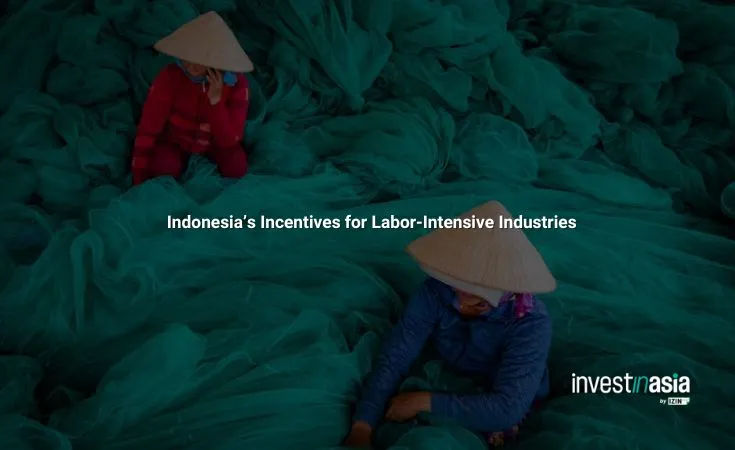In 2025, Indonesia is intensifying support for labor-intensive industries. These sectors are key to national employment and economic resilience. The government’s Rp20 trillion stimulus plan includes income tax relief, credit facilities, and extended tax holidays. It aims to secure jobs, support businesses, and attract foreign and domestic investment.
Also read: Why Indonesia Remains an Attractive Foreign Investment Destination in 2025
Target Sectors for Labor-Intensive Incentives


Indonesia’s policies focus on high-employment sectors vulnerable to economic shifts. These include:
- Textiles and Garments
- Footwear Manufacturing
- Furniture Production
- Food & Beverage Industries
- Toy Manufacturing
These sectors rely heavily on manual labor and are highly exposed to import competition and global market volatility.
Also read: Top Indonesian Strategic Sectors for Tax Incentives in 2025
Breakdown of Key Incentives
Income Tax Relief (PPh Pasal 21 DTP)
The government will cover employees’ income tax under this scheme for the full year of 2025. This boosts worker income without raising payroll costs for employers, helping maintain employment stability. This is regulated under PMK No. 10/2025.
Rp20 Trillion in Credit Support
The government has earmarked investment loans for labor-intensive sectors at subsidized interest rates. This move is expected to unlock capital for expansion, upgrades, and equipment modernization. Key sectors include garments, food and beverage, furniture, and toys.
Tax Holiday Extension Through 2025
Businesses in qualified industries can enjoy reduced or waived corporate income taxes under PMK No. 69/2024, an extension of PMK 130/2020. The duration and scale of benefits depend on investment value and whether the company qualifies as a pioneer industry.
Also read; Tax Holiday in Indonesia: A Comprehensive Guide for Foreign Investors
How to Qualify for These Incentives


To access the incentives, companies must:
- Be registered under Indonesian law and obtain a Business Identification Number (NIB) via the Online Single Submission (OSS) system.
- Operate in one of the designated labor-intensive sectors.
- Employ a minimum number of Indonesian workers (often 50+).
- Invest a defined capital threshold, depending on the facility (e.g., Rp100 billion for tax holiday eligibility).
- Submit complete documentation including business plans, financial projections, and ownership disclosures.
Also read: How to Apply for Indonesia Investment Incentives via OSS
Social and Economic Impacts
Indonesia’s labor-intensive incentive program is more than a financial boost. It reflects a strategy to:
- Protect Jobs: Many industries face layoffs due to competition and rising costs. These incentives aim to reverse that trend.
- Encourage Formal Employment: By covering taxes and easing credit, informal workers may transition into formal job structures.
- Attract Foreign Investment: Clear incentive structures and regulatory support make Indonesia more competitive in Asia’s manufacturing ecosystem.
- Boost Local Economies: Regional centers with heavy industry presence benefit through employment growth and supply chain expansion.
Regulatory Challenges and Industry Criticism
Industry groups like Apsyfi (Indonesian Fiber and Filament Yarn Producers Association) argue that incentives alone aren’t enough. Their concerns include:
- Illegal and undervalued imports flooding the market
- Lack of enforcement on protective trade regulations
- Need for pre-border inspection systems to prevent market disruption
Addressing these concerns is crucial. Financial tools must be paired with structural reforms to secure long-term viability.
Also read: Basic Salary and Average Salary in Indonesia: 2023 Data
Planned Policy Reforms in 2025
To strengthen the effectiveness of financial support, the government intends to introduce complementary measures.
- Import Restrictions: Limiting categories of imported goods that directly compete with local products
- Shift to Border Inspections: Replacing ineffective post-border inspections with real-time checks
- Improved Transparency in Incentive Access: Using digital platforms like OSS to track application progress and approvals
Indonesia’s labor-intensive incentive package for 2025 is a strategic response to protect jobs, attract investment, and ensure industrial resilience. However, the success of these measures hinges on structural reforms—especially in trade regulation—to create a stable, competitive manufacturing environment.
If you are considering starting a business in Indonesia, there are a number of resources and support services available to help you get started.
InvestinAsia is among the companies that specialize in aiding you with Indonesia company registration. We boast a team of seasoned experts who can guide you throughout the process of:
- Foreign company / PMA registration in Indonesia
- Indonesia representative office registration
- PT PMDN Set Up
- Virtual office setup in Indonesia
- Business registration number in Indonesia
- Indonesian Business Licenses
- Indonesia Trademark Registration
- Indonesia Tax Consultant and Compliance Services
If you are interested in starting a business in Indonesia, you can start by contacting us for FREE consultation.
FAQs
What industries qualify for Indonesia’s 2025 labor-intensive incentives?
Industries such as textiles, footwear, furniture, food and beverages, and toys are prioritized for support.
How can companies apply for these incentives?
Through the Online Single Submission (OSS) system. Necessary documentation includes a Business Identification Number (NIB), detailed business plans, and financial statements.
What is PMK 10/2025?
It’s a regulation authorizing the government to pay employee income tax (PPh Pasal 21) for certain labor-intensive industries.
What is the purpose of the Rp20 trillion investment credit?
To improve cash flow, stimulate capital investment, and help companies in labor-intensive sectors expand operations.
Are import restrictions part of the 2025 policy?
Yes, the government intends to tighten border inspection procedures and impose import restrictions to safeguard local industries.
References:




